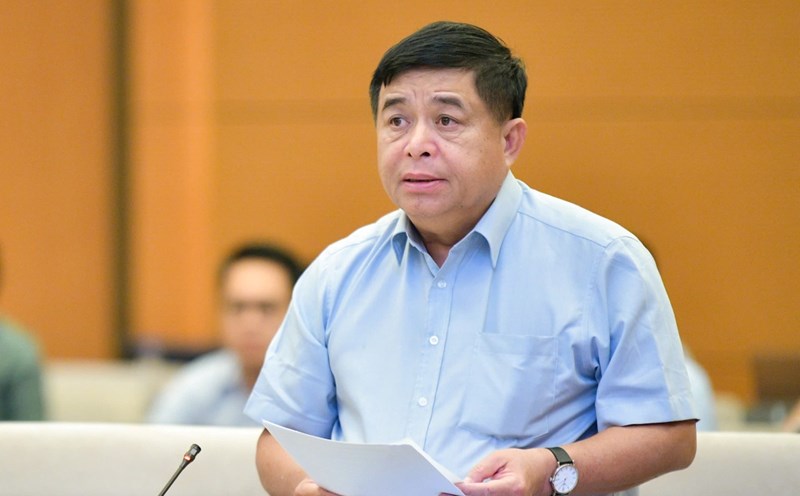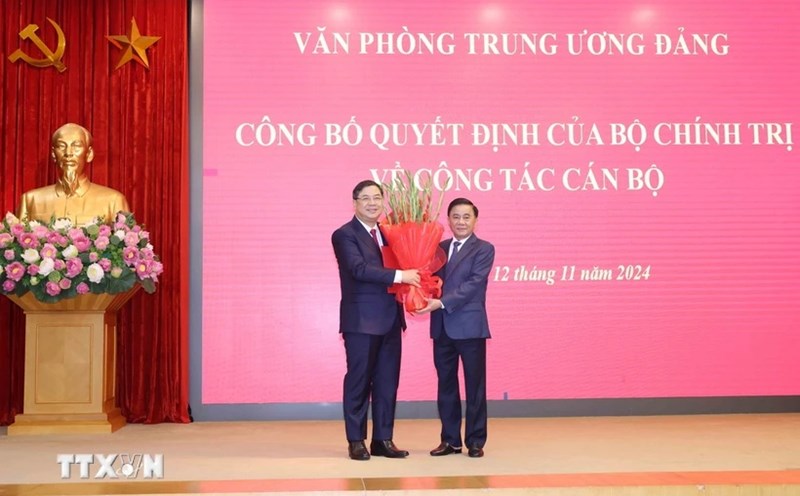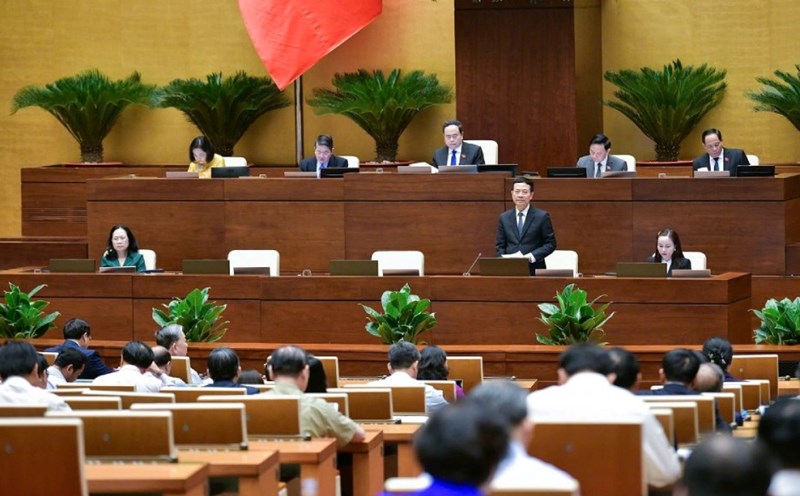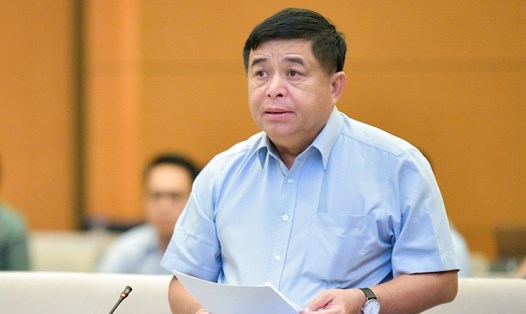"Have money but can't spend it"
Problems with procedures, legal documents or delays in site clearance are not uncommon in a series of key projects across the country. In the economic locomotive of Ho Chi Minh City, it is easy to name projects that are in a state of "having money but not being able to spend it" such as An Phu intersection, My Thuy intersection, Tran Quoc Hoan - Cong Hoa connecting road, National Highway 50 expansion to the tidal prevention project worth tens of thousands of billions of VND.
The An Phu Intersection Project (Thu Duc City) - a key traffic project at the eastern gateway of Ho Chi Minh City, started construction at the end of 2022 with a total investment of more than VND 3,400 billion. Earlier this year, the project was allocated VND 1,730 billion, including VND 500 billion from the central budget and VND 1,320 billion from the Ho Chi Minh City budget. However, due to the slow disbursement rate, in September, Ho Chi Minh City had to cut VND 600 billion from the city's capital (from VND 1,320 billion to VND 720 billion) to prioritize other projects.
According to the report from the Management Board of Investment and Construction of Traffic Works in Ho Chi Minh City on October 23, the disbursement progress of this project is still very slow. From the beginning of the year to October, the project has only disbursed more than 178.7 billion VND, of which the central budget has reached 170.8 billion VND (34%), while the Ho Chi Minh City budget has only disbursed more than 7.8 billion VND, reaching a modest level of 1%.
Also in Thu Duc City, the My Thuy intersection project has a capital allocation of more than VND907 billion in 2024, but so far only more than VND1.8 billion has been disbursed, reaching 0.2% of the total capital. Meanwhile, the Ho Chi Minh City Tidal Flood Control Project, Phase 1, was allocated VND6,800 billion this year, but encountered difficulties in legal procedures under the authority of central agencies, leading to unfeasible disbursement in 2024.
Therefore, Ho Chi Minh City has had to adjust all of this capital for other projects. Although the project has completed more than 90% of the volume, due to legal problems, the project has had to be suspended since November 2020 until now.
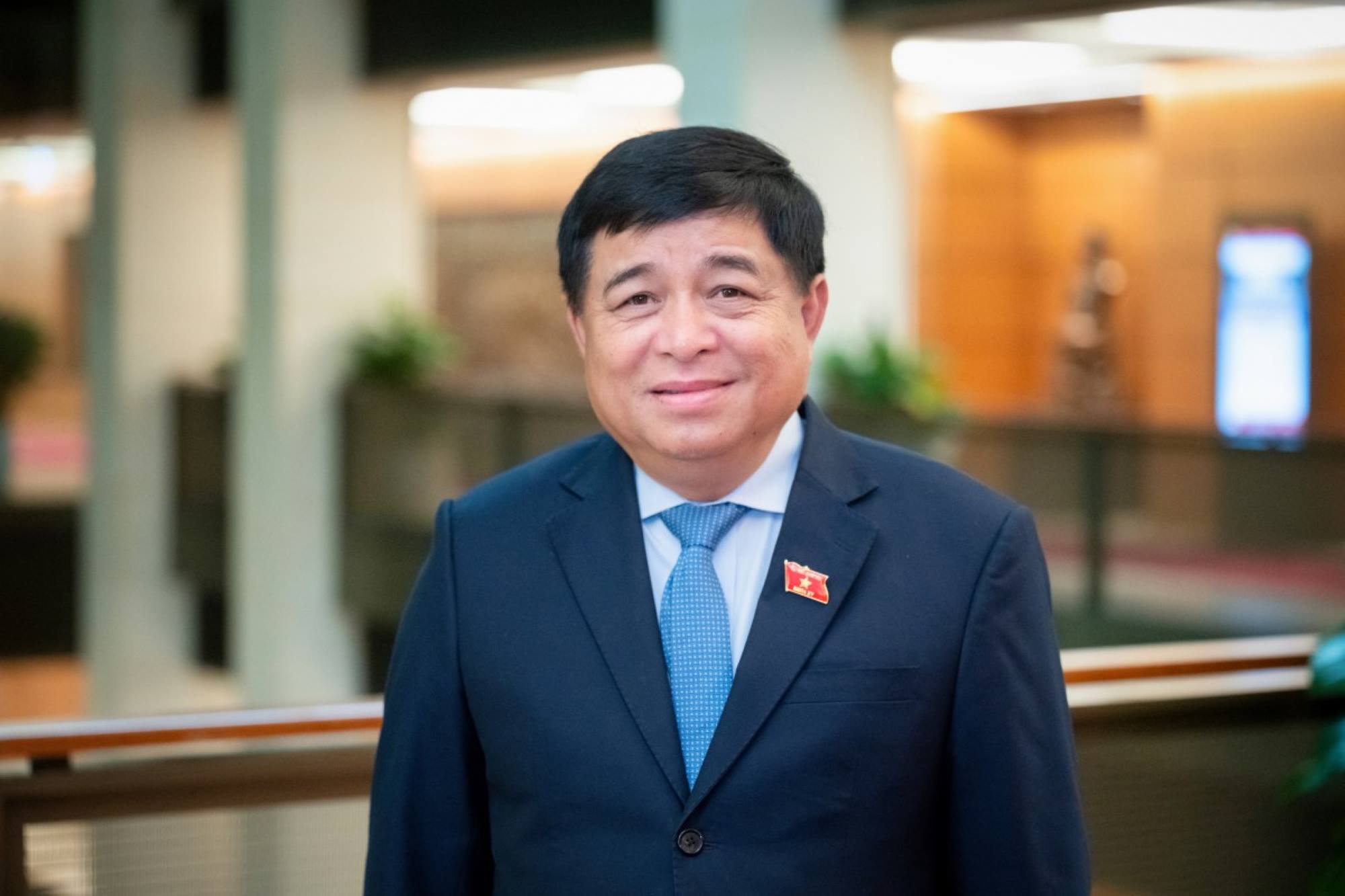
Promote decentralization and delegation of authority
The obstacles in public investment disbursement are expected to be cleared when the draft Law amending and supplementing a number of articles of the Law on Planning, the Law on Investment, the Law on Investment under the public-private partnership model, the Law on Bidding, and the revised Law on Public Investment are considered at the 8th Session of the 15th National Assembly.
According to Minister of Planning and Investment Nguyen Chi Dung, the revised content of the Law on Public Investment has fully and comprehensively specified five major policy groups, deeply demonstrating the spirit of breakthrough, reform, decentralization, and delegation of power of the Party Central Committee, Politburo, National Assembly, and Government according to the motto "locality decides, locality does, locality is responsible".
The Central Government, the National Assembly, and the Government play a role in creating, strengthening institutional improvement, and inspecting and supervising; ensuring that people, jobs, responsibilities, and results are clear; cutting down and simplifying administrative procedures, not allowing responsibility to be passed on, and avoiding the creation of a “request-grant” mechanism...
The draft law has received high appreciation from ministries, branches, localities, international organizations, and foreign donors, especially for fundamentally removing existing problems, limitations, obstacles, and bottlenecks arising in the implementation of the 2019 Law on Public Investment. The provisions on decentralization and delegation of authority ensure clear identification of people, tasks, and responsibilities for easy inspection, supervision, monitoring, and evaluation, meeting the requirements of management and use of public investment resources to implement three strategic breakthroughs, especially infrastructure breakthroughs in the new situation.
According to Deputy Minister of Planning and Investment Tran Quoc Phuong, the design of the provisions of this law is open and creates development. In particular, the new law has partially solved the long-standing bottleneck, which is "capital waiting for projects", having money but not being able to disburse. Overcoming the situation of "approving projects without money" with the solution of "loosening the room" for the medium-term plan. In particular, it is possible to loosen 50% of the medium-term plan for next year, at that time the project will be ready and the money for the project will also be available faster.
"In addition, the new and also breakthrough point of the Law on Public Investment (amended) is to partly overcome the fear of making mistakes, fear of taking responsibility, and reluctance of some officials to act when clearly defining authority and implementation process" - Deputy Minister Tran Quoc Phuong emphasized.
Strengthening private sector participation
Speaking to Lao Dong Newspaper, Dr. Nguyen Quoc Viet - Deputy Director of the Institute of Economic and Policy Research (VEPR) said that the difficulties and obstacles in disbursing public investment capital are mainly due to the overlap and contradiction between laws and regulations of ministries, branches and localities, leading to complicated and lengthy processes and procedures. In addition, the decentralization, delegation of authority and responsibilities of agencies and individuals have not been clearly defined.
According to Dr. Nguyen Quoc Viet, at the 8th Session, the 15th National Assembly is expected to consider amending a number of laws. In particular, the project "1 law amending 7 laws" is expected to be a breakthrough to remove difficulties in public investment, ensuring the synchronous and consistent application of laws. Avoid the situation where after amending one law, another law becomes entangled.
The amendment of one law to many laws can only temporarily review the obvious conflicts, but an investment project still has other problems when it is subject to many different regulations of ministries and branches, and will have to go through the procedures for permission, which takes a lot of time when having to seek opinions from many different ministries and branches.
To resolve the problems and overlaps, Dr. Nguyen Quoc Viet proposed that in addition to one law amending many laws, it is necessary to promote decentralization and delegation of power to localities, grant higher autonomy, along with clear responsibilities, and have specific solutions to encourage localities to boldly apply specific mechanisms in resolving overlapping conflicts between legal rules and law enforcement documents of ministries and branches, or create regional and inter-regional coordination mechanisms in public investment to develop key infrastructure related to many localities.
In the long term, Dr. Viet believes that it is necessary to boldly assign or use more experience from the private sector. If there is a suitable way to increase the participation of the private sector, especially large private enterprises with capacity in implementing important infrastructure projects, through forms such as build-operate-transfer contracts (possibly in the form of BT), it will help reduce the burden of project management and implementation for state agencies.


